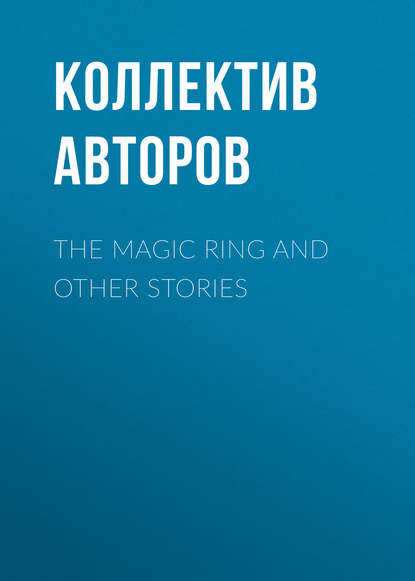По всем вопросам обращайтесь на: info@litportal.ru
(©) 2003-2024.
✖
The Magic Ring and Other Stories
Настройки чтения
Размер шрифта
Высота строк
Поля
'If your son is as wonderfully clever as you say, and if there is nothing in the world that he cannot do, let him build a magnificent castle, just opposite my palace windows, in four and twenty hours. The palace must be joined together by a bridge of pure crystal. On each side of the bridge there must be growing trees, having golden and silver apples, and with birds of paradise among the branches. At the right of the bridge there must be a church, with five golden cupolas; in this church your son shall be wedded to my daughter, and we will keep the wedding festivities in the new castle. But if he fails to execute this my royal command, then, as a just but mild monarch, I shall give orders that you and he are taken, and first dipped in tar and then in feathers, and you shall be executed in the market-place for the entertainment of my courtiers.'
And a smile played round the King's lips as he finished speaking, and his courtiers and counsellors shook with laughter when they thought of the old woman's folly, and praised the King's wise device, and said to each other, 'What a joke it will be when we see the pair of them tarred and feathered! The son is just as able to grow a beard on the palm of his hand as to execute such a task in twenty-four hours.'
Now the poor old woman was mortally afraid, and in a trembling voice she asked:
'Is that really your royal will, O King? Must I take this order to my poor son?'
'Yes, old dame; such is my command. If your son carries out my order, he shall be rewarded with my daughter; but if he fails, away to the tar-barrel and the stake with you both!'
On her way home the poor old woman shed bitter tears, and when she saw Martin she told him what the King had said, and sobbed out:
'Didn't I tell you, my son, that you should marry someone of your own rank? It would have been better for us this day if you had. As I told you, my going to Court has been as much as our lives are worth, and now we will both be tarred and feathered, and burnt in the public market-place. It is terrible!' and she moaned and cried.
'Never fear, little mother,' answered Martin; 'trust me, and you will see all will be well. You may go to sleep with a quiet mind.'
And, stepping to the front of the hut, Martin threw his ring from the palm of one hand into the other, upon which twelve youths instantly appeared, and demanded what he wanted them to do. Then he told them the King's commands, and they answered that by the next morning all should be accomplished exactly as the King had ordered.
Next morning when the King awoke, and looked out of his window, to his amazement he beheld a magnificent castle, just opposite his own palace, and joined to it a bridge of pure crystal.
At each side of the bridge trees were growing, from whose branches hung golden and silver apples, among which birds of paradise perched. At the right, gleaming in the sun, were the five golden cupolas of a splendid church, whose bells rang out, as if they would summon people from all corners of the earth to come and behold the wonder. Now, though the King would much rather have seen his future son-in-law tarred, feathered, and burnt at the stake, he remembered his royal oath, and had to make the best of a bad business. So he took heart of grace, and made Martin a Duke, and gave his daughter a rich dowry, and prepared the grandest wedding-feast that had ever been seen, so that to this day the old people in the country still talk of it.
After the wedding Martin and his royal bride went to dwell in the magnificent new palace, and here Martin lived in the greatest comfort and luxury, such luxury as he had never imagined. But though he was as happy as the day was long, and as merry as a grig, the King's daughter fretted all day, thinking of the indignity that had been done her in making her marry Martin, the poor widow's son, instead of a rich young Prince from a foreign country. So unhappy was she that she spent all her time wondering how she should get rid of her undesirable husband. And first she determined to learn the secret of his power, and, with flattering, caressing words, she tried to coax him to tell her how he was so clever that there was nothing in the world that he could not do. At first he would tell her nothing; but once, when he was in a yielding mood, she approached him with a winning smile on her lovely face, and, speaking flattering words to him, she gave him a potion to drink, with a sweet, strong taste. And when he had drunk it Martin's lips were unsealed, and he told her that all his power lay in the magic ring that he wore on his finger, and he described to her how to use it, and, still speaking, he fell into a deep sleep. And when she saw that the potion had worked, and that he was sound asleep, the Princess took the magic ring from his finger, and, going into the courtyard, she threw it from the palm of one hand into the other. On the instant the twelve youths appeared, and asked her what she commanded them to do. Then she told them that by the next morning they were to do away with the castle, and the bridge, and the church, and put in their stead the humble hut in which Martin used to live with his mother, and that while he slept her husband was to be carried to his old lowly room; and that they were to bear her away to the utmost ends of the earth, where an old King lived who would make her welcome in his palace, and surround her with the state that befitted a royal Princess.
'You shall be obeyed,' answered the twelve youths at the same moment. And lo and behold! the following morning, when the King awoke and looked out of his window, he beheld to his amazement that the palace, bridge, church, and trees had all vanished, and there was nothing in their place but a bare, miserable-looking hut.
Immediately the King sent for his son-in-law, and commanded him to explain what had happened. But Martin looked at his royal father-in-law, and answered never a word. Then the King was very angry, and, calling a council together, he charged Martin with having been guilty of witchcraft, and of having deceived the King, and having made away with the Princess; and he was condemned to imprisonment in a high stone tower, with neither meat nor drink, till he should die of starvation.
Then, in the hour of his dire necessity, his old friends Schurka (the dog) and Waska (the cat) remembered how Martin had once saved them from a cruel death; and they took counsel together as to how they should help him. And Schurka growled, and was of opinion that he would like to tear everyone in pieces; but Waska purred meditatively, and scratched the back of her ear with a velvet paw, and remained lost in thought. At the end of a few minutes she had made up her mind, and, turning to Schurka, said: 'Let us go together into the town, and the moment we meet a baker you must make a rush between his legs and upset the tray from off his head; I will lay hold of the rolls, and will carry them off to our master.' No sooner said than done. Together the two faithful creatures trotted off into the town, and very soon they met a baker bearing a tray on his head, and looking round on all sides, while he cried:
'Fresh rolls, sweet cake,
Fancy bread of every kind.
Come and buy, come and take.
Sure you'll find it to your mind.'
At that moment Schurka made a rush between his legs-the baker stumbled, the tray was upset, the rolls fell to the ground, and, while the man angrily pursued Schurka, Waska managed to drag the rolls out of sight behind a bush. And when a moment later Schurka joined her, they set off at full tilt to the stone tower where Martin was a prisoner, taking the rolls with them.
Waska, being very agile, climbed up by the outside to the grated window, and called in an anxious voice:
'Are you alive, master?'
'Scarcely alive-almost starved to death,' answered Martin in a weak voice. 'I little thought it would come to this, that I should die of hunger.'
'Never fear, dear master. Schurka and I will look after you,' said Waska. And in another moment she had climbed down and brought him back a roll, and then another, and another, till she had brought him the whole tray-load. Upon which she said: 'Dear master, Schurka and I are going off to a distant kingdom at the utmost ends of the earth to fetch you back your magic ring. You must be careful that the rolls last till our return.'
And Waska took leave of her beloved master, and set off with Schurka on their journey. On and on they travelled, looking always to right and left for traces of the Princess, following up every track, making inquiries of every cat and dog they met, listening to the talk of every wayfarer they passed; and at last they heard that the kingdom at the utmost ends of the earth where the twelve youths had borne the Princess was not very far off. And at last one day they reached that distant kingdom, and, going at once to the palace, they began to make friends with all the dogs and cats in the place, and to question them about the Princess and the magic ring; but no one could tell them much about either. Now one day it chanced that Waska had gone down to the palace cellar to hunt for mice and rats, and seeing an especially fat, well-fed mouse, she pounced upon it, buried her claws in its soft fur, and was just going to gobble it up, when she was stopped by the pleading tones of the little creature, saying, 'If you will only spare my life I may be of great service to you. I will do everything in my power for you; for I am the King of the Mice, and if I perish the whole race will die out.'
'So be it,' said Waska. 'I will spare your life; but in return you must do something for me. In this castle there lives a Princess, the wicked wife of my dear master. She has stolen away his magic ring. You must get it away from her at whatever cost; do you hear? Till you have done this I won't take my claws out of your fur.'
'Good!' replied the mouse; 'I will do what you ask.' And, so saying, he summoned all the mice in his kingdom together. A countless number of mice, small and big, brown and grey, assembled, and formed a circle round their king, who was a prisoner under Waska's claws. Turning to them he said: 'Dear and faithful subjects, whoever among you will steal the magic ring from the strange Princess will release me from a cruel death; and I shall honour him above all the other mice in the kingdom.'
Instantly a tiny mouse stepped forward and said: 'I often creep about the Princess's bedroom at night, and I have noticed that she has a ring which she treasures as the apple of her eye. All day she wears it on her finger, and at night she keeps it in her mouth. I will undertake, sire, to steal away the ring for you.'
And the tiny mouse tripped away into the bedroom of the Princess, and waited for night-fall; then, when the Princess had fallen asleep, it crept up on to her bed, and gnawed a hole in the pillow, through which it dragged one by one little down feathers, and threw them under the Princess's nose. And the fluff flew into the Princess's nose, and into her mouth, and starting up she sneezed and coughed, and the ring fell out of her mouth on to the coverlet. In a flash the tiny mouse had seized it and brought it to Waska as a ransom for the King of the Mice. Thereupon Waska and Schurka started off, and travelled night and day till they reached the stone tower where Martin was imprisoned; and the cat climbed up the window, and called out to him:
'Martin, dear master, are you still alive?'
'Ah! Waska, my faithful little cat, is that you?' replied a weak voice. 'I am dying of hunger. For three days I have not tasted food.'
'Be of good heart, dear master,' replied Waska; 'from this day forth you will know nothing but happiness and prosperity. If this were a moment to trouble you with riddles, I would make you guess what Schurka and I have brought you back. Only think, we have got you your ring!'
At these words Martin's joy knew no bounds, and he stroked her fondly, and she rubbed up against him and purred happily, while below Schurka bounded in the air, and barked joyfully. Then Martin took the ring, and threw it from one hand into the other, and instantly the twelve youths appeared and asked what they were to do.
'Fetch me first something to eat and drink, as quickly as possible; and after that bring musicians hither, and let us have music all day long.'
Now when the people in the town and palace heard music coming from the tower they were filled with amazement, and came to the King with the news that witchcraft must be going on in Martin's Tower, for, instead of dying of starvation, he was seemingly making merry to the sound of music, and to the clatter of plates, and glass, and knives and forks; and the music was so enchantingly sweet that all the passers-by stood still to listen to it. On this the King sent at once a messenger to the Starvation Tower, and he was so astonished with what he saw that he remained rooted to the spot. Then the King sent his chief counsellors, and they too were transfixed with wonder. At last the King came himself, and he likewise was spellbound by the beauty of the music.
Then Martin summoned the twelve youths, spoke to them, saying, 'Build up my castle again, and join it to the King's palace with a crystal bridge; do not forget the trees with the golden and silver apples, and with the birds of paradise in the branches; and put back the church with the five cupolas, and let the bells ring out, summoning the people from the four corners of the kingdom. And one thing more: bring back my faithless wife, and lead her into the women's chamber.'
And it was all done as he commanded, and, leaving the Starvation Tower, he took the King, his father-in-law, by the arm, and led him into the new palace, where the Princess sat in fear and trembling, awaiting her death. And Martin spoke to the King, saying, 'King and royal father, I have suffered much at the hands of your daughter. What punishment shall be dealt to her?'
Then the mild King answered: 'Beloved Prince and son-in-law, if you love me, let your anger be turned to grace-forgive my daughter, and restore her to your heart and favour.'
And Martin's heart was softened and he forgave his wife, and they lived happily together ever after. And his old mother came and lived with him, and he never parted with Schurka and Waska; and I need hardly tell you that he never again let the ring out of his possession.
THE WHITE DUCK
Once upon a time a great and powerful King married a lovely Princess. No couple were ever so happy; but before their honeymoon was over they were forced to part, for the King had to go on a warlike expedition to a far country, and leave his young wife alone at home. Bitter were the tears she shed, while her husband sought in vain to soothe her with words of comfort and counsel, warning her, above all things, never to leave the castle, to hold no intercourse with strangers, to beware of evil counsellors, and especially to be on her guard against strange women. And the Queen promised faithfully to obey her royal lord and master in these four matters.
So when the King set out on his expedition she shut herself up with her ladies in her own apartments, and spent her time in spinning and weaving, and in thinking of her royal husband. Often she was very sad and lonely, and it happened that one day while she was seated at the window, letting salt tears drop on her work, an old woman, a kind, homely-looking old body, stepped up to the window, and, leaning upon her crutch, addressed the Queen in friendly, flattering tones, saying:
'Why are you sad and cast down, fair Queen? You should not mope all day in your rooms, but should come out into the green garden, and hear the birds sing with joy among the trees, and see the butterflies fluttering above the flowers, and hear the bees and insects hum, and watch the sunbeams chase the dew-drops through the rose-leaves and in the lily-cups. All the brightness outside would help to drive away your cares, O Queen.'
For long the Queen resisted her coaxing words, remembering the promise she had given the King, her husband; but at last she thought to herself: After all, what harm would it do if I were to go into the garden for a short time and enjoy myself among the trees and flowers, and the singing birds and fluttering butterflies and humming insects, and look at the dew-drops hiding from the sunbeams in the hearts of the roses and lilies, and wander about in the sunshine instead of remaining all day in this room? For she had no idea that the kind-looking old woman leaning on her crutch was in reality a wicked witch, who envied the Queen her good fortune, and was determined to ruin her. And so, in all ignorance, the Queen followed her out into the garden and listened to her smooth, flattering words. Now, in the middle of the garden there was a pond of water, clear as crystal, and the old woman said to the Queen:
'The day is so warm, and the sun's rays so scorching, that the water in the pond looks very cool and inviting. Would you not like to bathe in it, fair Queen?'
'No, I think not,' answered the Queen; but the next moment she regretted her words, and thought to herself: Why shouldn't I bathe in that cool, fresh water? No harm could come of it. And, so saying, she slipped off her robes and stepped into the water. But scarcely had her tender feet touched the cool ripples when she felt a great shove on her shoulders, and the wicked witch had pushed her into the deep water, exclaiming:
'Swim henceforth, White Duck!'
And the witch herself assumed the form of the Queen, and decked herself out in the royal robes, and sat among the Court ladies, awaiting the King's return. And suddenly the tramp of horses' hoofs was heard, and the barking of dogs, and the witch hastened forward to meet the royal carriages, and throwing her arms round the King's neck, kissed him. And in his great joy the King did not know that the woman he held in his arms was not his own dear wife, but a wicked witch.
In the meantime, outside the palace walls, the poor White Duck swam up and down the pond; and near it laid three eggs, out of which there came one morning two little fluffy ducklings and a little ugly drake. And the White Duck brought the little creatures up, and they paddled after her in the pond, and caught gold-fish, and hopped upon the bank and waddled about, ruffling their feathers and saying 'Quack, quack' as they strutted about on the green banks of the pond. But their mother used to warn them not to stray too far, telling them that a wicked witch lived in the castle beyond the garden, adding, 'She has ruined me, and she will do her best to ruin you.' But the young ones did not listen to their mother, and playing about the garden one day, they strayed close up to the castle windows. The witch at once recognised them by their smell, and ground her teeth with anger; but she hid her feelings, and, pretending to be very kind, she called them to her and joked with them, and led them into a beautiful room, where she gave them food to eat, and showed them a soft cushion on which they might sleep. Then she left them and went down into the palace kitchens, where she told the servants to sharpen the knives, and to make a great fire ready, and hang a large kettleful of water over it.
In the meantime the two little ducklings had fallen asleep, and the little drake lay between them, covered up by their wings, to be kept warm under their feathers. But the little drake could not go to sleep, and as he lay there wide awake in the night he heard the witch come to the door and say:
'Little ones, are you asleep?'

















